The Dogma Of Hell: Hell is the Receptacle of All the Moral Filth of Humanity
We don’t discuss the dogma of hell as much as we should. And yes, it is a dogma.
In fact, we don’t discuss the “Four Last Things” very much. It’s not fashionable. The thought of it is unpleasant. Yet, the desire to NOT end up in hell, has inspired many Saints to live holy lives.
It is a place of pure, disgusting darkness with unimaginable creatures that assail day and night.
Sometimes people are relieved when the wicked die, but in reality, none of us should celebrate damnation. There, but for the grace of God, go we.
Imagine all the sins that you try to avoid. Now imagine all of them being concentrated in one area.
This is what hell is.
If you are not used to reading about hell, you may experience skepticism. Hopefully you experience fear and a strong desire to not end up in hell. May it please God you cultivate a real hunger for souls.
The Dogma of Hell
In the Dogma of Hell, by Rev. Father Francois Xavier Schouppe, S.J., we find this very scary description of hell:
“Hell is the sink of the world and the receptacle of all the moral filth of humanity.
There, impurity, intemperance, blasphemy, pride, injustice and all the vices which are like the rottenness of souls, are found heaped up. To this moral filth a corporal stench is added more insupportable than all the stenches of hospitals and corpses.
If the body of a damned person, says St. Bonaventure, were deposited on the earth, that of itself alone would be sufficient to make the earth uninhabitable; it would fill it with its infection, as a corpse that might be left to rot in a house would infect it all the way through.”
The Dogma of Hell: Illustrated by Facts Taken From Profane and Sacred History
Use coupon code BSA for 15% off
“Another torture of hell is the horrible society of the devils and the damned. There are some wretched sinners who, seeing plainly that they are walking toward Hell, are comforted by saying, “I shall not be there alone!” Sad consolation! It is that of the convicts sentenced to wear irons together in the galleys.
Still it is intelligible how a convict finds a certain life in the company of his kind. Alas! It will not be thus in Hell, in which the damned will be mutual executioners. “There,” says St. Thomas, “the associates of his wretchedness, far from alleviating the lot of the damned soul, will make it more intolerable for him.” (Suppl. 9, 86, A. 1). The society of even those persons who on earth were their best friends is insupportable to the damned in Hell. They would esteem themselves happy to have tigers and lions for companions, rather than their relatives, brothers, or their own parents.
Do you wish to see the poverty of hell and the privations that are suffered there by those who made the goods of this world their god? Consider the wicked rich man of the Gospel.
Accustomed during his life to eat delicate meats served in silver utensils, to drink exquisite wines in goblets of gold, to wear purple and fine linen, having become an inhabitant of Hell, he found himself brought down to the last extremity of need. He who refused poor Lazarus the crumbs from his table, was obliged to beg in his turn. He asks, not delicacies, but a drop of cold water, which he will be happy to receive from a leper’s
finger. Now, this drop of water is refused to him. Has not the Savior said: “Woe to you that are rich, for you have your consolation. Woe to you that are filled, for you shall hunger.” (Luke 6:25). “
“There is no light,” writes St. Teresa (Autobiography, Chapter 25), “in the eternal pit, only darkness of the deepest dye; and yet, O mystery! Although no light shines, all that can be most painful to the sight is perceived. Among those objects which torture the eyes of the damned, the most frightful are the demons, who reveal themselves in all their hideousness.
St. Bernard speaks of a religious who, being in his cell, uttered all of a sudden frightful cries, which attracted the community. He was found beside himself and uttering only these sorrowful words: “Accursed be the day I entered religion!” Terrified and troubled by this curse, the cause of which they did not understand, his brethren questioned and encouraged him and spoke to him of confidence in God. Soon, being quieted, he replied, “no, no, it is not the religious life that I should curse. On the contrary, blessed be the day I became a religious! My brethren, do not be astonished at seeing my mind disturbed. Two devils have appeared to me; their horrible appearance has put me out of my senses. What monstrosity! Ah! Rather all torments than again to endure the sight of them!”
“A holy priest was exorcising a demoniac, and he asked the demon what pains he was suffering in Hell. “An eternal fire,” he answered, “an eternal malediction, an eternal rage, and a frightful despair at being never able to gaze upon Him who created me.” “What would you do to have the happiness of seeing God?” “To see Him but for one moment, I should willingly consent to endure my torments for 10,000 years. But vain desires! I shall suffer forever and never see Him!”
“One day, a holy soul was meditating upon Hell, and considering the eternity of the pains, the frightful “always… never,” she was thrown into complete confusion by it, because she was unable to reconcile this immeasurable severity with the divine goodness and other perfections. “Lord,” she said, “I submit to Thy judgments, but do not push the rigors of
Thy justice to far.”“Do you understand,” was the answer, “what sin is? To sin is to say to God, I will not serve Thee! I despise Thy law, I laugh at Thy threats!” “I understand, Lord, that sin is an outrage to Thy Majesty.” “Well, measure, if you can, the greatness of this outrage.” “Lord, this outrage is infinite, since it attacks infinite Majesty.” “Must it not, then, be punished by an infinite chastisement? Now, as the punishment could not be infinite in its intensity, justice demands that it be so at least in its duration. Accordingly, it is the divine justice that wills the eternity of the pains: the terrible ‘always,’ the terrible ‘never.’ The damned themselves will be obliged to render homage to this justice, and cry out in the midst of their torments: ‘Thou art just, O Lord, and thy judgments are equitable.’ (Psalm 118: 137).”
Very scary imagery.
Let us resolve to live holy lives and make use of the sacraments, often, so that we can avoid hell.
Source: “The Dogma of Hell, Illustrated by Facts Taken from Profane and Sacred History.” by Rev. Father Francois Xavier Schouppe, S.J.
This article was originally posted in 2019 and updated in 2023.

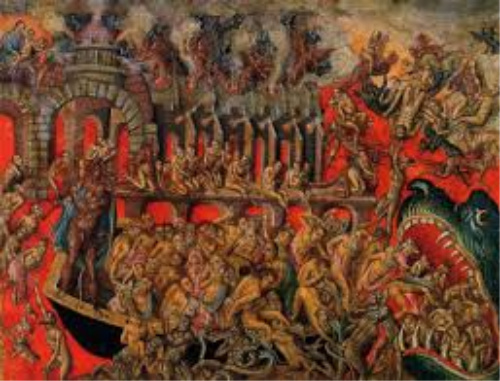

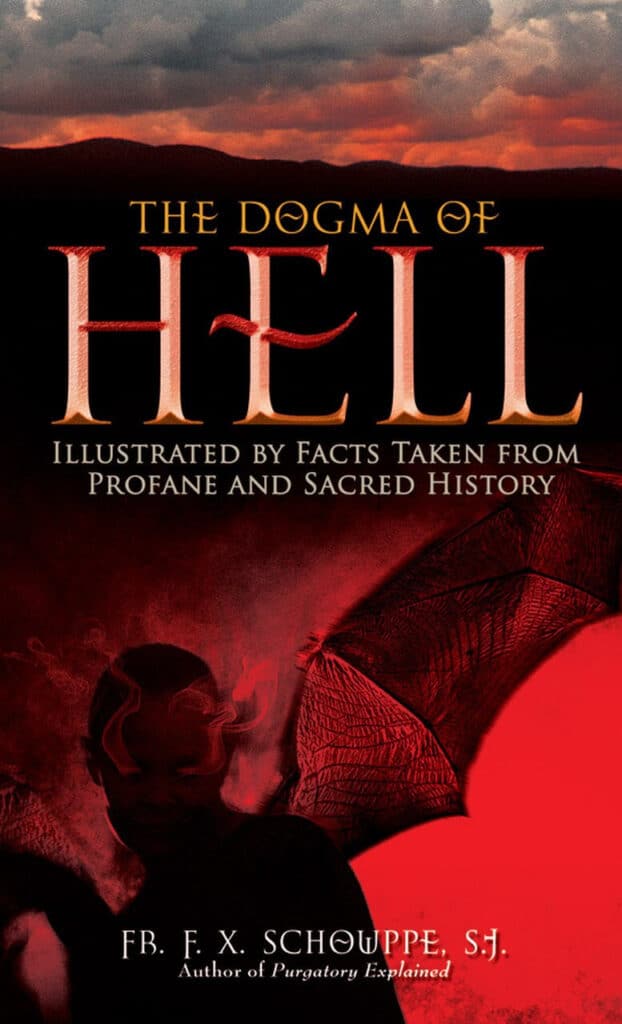
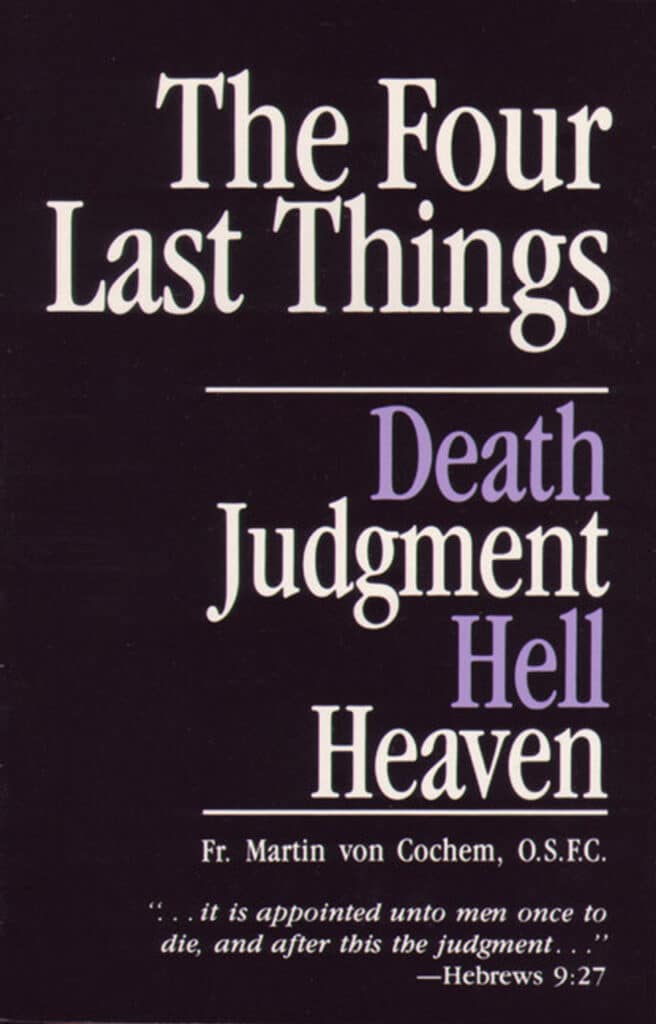
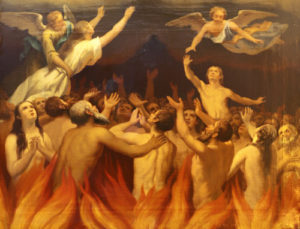
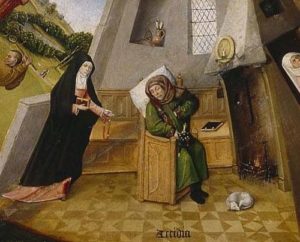


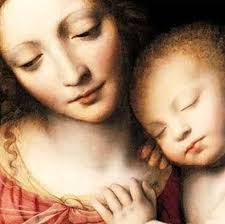

What a horrendous and monstrous God Roman Catholicism promotes. What father tortures his children for their offenses? Would a father’s heart do such a thing? Would love do such a thing – torment with no end in sight? We have found people who have held captive and tortured others for decades, and rightly describe them as sociopaths and beasts, yet we ascribe the same behavior to the God who is love without the slightest qualm of conscience.
Do you even think about what you are saying here? The all-powerful God who can do anything He so desires, refuses to heal His child and instead consigns that child to flames forever. Can I run to such a God with my faults, sins, and imperfections and feel comfortable about seeking Him? Or do I approach Him with fear and groveling, wondering if He will turn on me for the sins that so easily beset me, even after I confess them and try to leave them behind?
I leave you to your Roman fantasy. You cannot find hell in the Bible, you cannot find eternal torment, and you cannot find such a God. The only way you can stubbornly persist in this belief is to ignore what the Scriptures say in favor of your mistranslations (the word “hell” is not found anywhere in Scripture – NO WHERE!) What kind of God who IS LOVE would refuse the repentance of either spirit or soul that has come to its senses and realizes the depravity of its mistake? Jesus taught us that we must, in order to be like our heavenly Father, love our enemies and do good to them. But apparently this order does not apply to the God who gave it. In order to be like God, therefore, we must kill, torture, and enslave our enemies.
In closing, I challenge you to give a good and proper answer to these 10 questions regarding the idea of an eternal hell: https://http4281.wordpress.com/2017/05/20/10-questions/
First, God cannot be wrong,
As in his powerful commandments
Where you shall have no other god but him (as a smart alec, for He made you out of nothing.)
He insists you do not insult him.
Second, He has foretold you that he has written Himself into your HEART.
You, the same as an ignorant child, understands Him, without instruction.
Like a rug, He has weaved himself into your heart and your understanding.
Therefore, you have no excuse – to disrespect him and find other philosophies to cling to, bc the devil found your weakness and lured you away, with lazy bones lightweight and no-rules philosophies.
The exact reason for Hades is that we have been made as a walking temple.
Our left arm and hand, closest to the heart does actions pertaining from the heart.
When you sin with your left arm, all the blessings he has given for you to use your left arm are against the heart.
You have used an appendage (your arm; blessed without measure. Ask a paralytic) and performed evil even against your given heart.
He gives you chance after chance.
He can read your soul. You can not.
He knows you to be a throw away.
Unless it is an ignoble abomination, as bastard children you have made.
These people are kicked out of town, correctly. Not supported, etc.
Children have no voice or entertainment. The same for a prince, who owns none of his inheritance until he comes of age.
These are laws of nobleness, righteousness, and class. They are not broken.
Just bc you adhere to modern world views makes you even more of a lightweight thinker.
If laws are broken, you are no longer a part of the family. This is a fact, unless Moses and all the rest are wrong and you are right.
He gave you a brain, you know what is right and wrong
You loose your soul if you fly wrong, not right. He has told you.
But,
Why for eternity?
Cuz there’s no way – he’s gonna let his goodly children play with the bad eggs in eternity.
You ain’t about to come in the yard to play.
Death is gonna happen, fool.
This is the proof – of a payment (happiness) or payback (doom).
Choose.
Quit trying to talk your way out of this death sentence.
He gave you so much, and you found not one ounce of love for Him in your trial lifetime. Insane!
Well said Amen…He gave us Life by given His own and the choice to do his will here on earth is not force on us… Elisha Forest I hope you choose to Honor and Exalt Him before the end of your time. God bless us All
I’m sorry I meant my previous reply to Edward Hará 🥺
Scripture
Matt. 3:12; Luke 3:17 – John the Baptist said the Lord will burn the chaff with unquenchable fire. This unquenchable fire is the state of eternal separation from God, which the Church has called “hell” for 2,000 years. Some Protestant communities no longer acknowledge the reality of hell.
Matt. 25:41 – Jesus says, “Depart from me, you cursed, into the eternal fire prepared for the devil and his angels.”
Matt. 25:46 – Jesus says, “they will go away into eternal punishment” which is in reference to this eternal fire.
Mark 9:47-48 – Jesus refers to hell as where the worm does not die and the fire is not quenched. It lasts forever.
2 Thess. 1:6-9 – the angels will come with flaming fire and the disobedient will suffer punishment of eternal destruction. It is important to note that “destruction” does not mean “annihilation,” as some Protestant denominations teach. It means eternal exclusion from the presence of God.
Jude 6-7 – the rebelling angels, and Sodom and Gomorrah, serve as an example by undergoing a punishment of eternal fire.
Rev. 14:11 – the worshipers of the beast suffer and the smoke of their torment goes up for ever and ever.
Rev. 20:10 – they’re tormented in the lake of fire and brimstone day and night forever and ever.
Isaiah 33:14 – “Who of us can dwell in the everlasting fire?” This is a reference to hell which is forever.
Isaiah 66:24 – their worm shall not die and their fire shall not be quenched. We cannot fathom the pain of this eternal separation from God.
Jer. 15:14 – in my anger a fire is kindled which shall burn forever. Hell is the proper compliment to the eternal bliss of heaven.
Judith 16:17 – in the day of judgment the Lord will take vengeance on the wicked and they shall weep in pain forever. Hell is a place that sinners have prepared for themselves by rejecting God, who desires all people to be saved in His Son Jesus Christ. God sends no one to hell.
We are His only created beings with free will. God will accept true repentance always. Some people seem to think that if they repent they are good forever. Many repent with true sorrow and fall back into the same sin. Prayer, confession and repentance will lead us out of this vicious circle. We receive graces with every confession and repentance. We are strengthened in our spiritual lives. God is perfect love but in the glory of His creation nothing imperfect can ever behold Him. So we need to be purified either through our suffering, freely given back to Him, on earth. We need to remain in a state of grace. Those who die unpurified on earth, but with no mortal sins will be purified in purgatory. He is a loving God but also just. If we choose not to follow His laws then we ourselves choose to go to hell. We will all stand before Him one day and if we have not chosen Him to live by then when we see all the evil that we have done, the careless word that caused someone else to go astray, the things we didn’t do that caused others pain etc., the things they did because of our lack of charity – if we are one of those souls we ourselves will choose hell. Confession and repentance are the keys to forgiveness. Our God is perfect love.
Qué clase de Dios que ES AMOR rechazaría el arrepentimiento? del espíritu o del alma que ha entrado en razón y se da cuenta de la depravación de su error?
Tú mismo lo dices, “ARREPENTIMIENTO”
si no hay arrepentimiento te vas al infierno. Tan claro como eso.
You do realise where the Bible came from right? It didn’t fall from the sky into a Protestants hands. Sola Scriptura is unbind, you have no idea what you’re talking about. Just nonsense.
Dear Edward, no answer is necessary for you or will ever be sufficient. Leave Catholics with their dogma of hell. Why do you want to worry? Ain’t you already in happiness and bliss in your unbelief?
Do you realize the dogma of hell, found nowhere in the Bible, has done more to make atheists than the devil has? Who would be attracted to such a God? I am in joy of the Lord to find out that He is not the angry, vengeful God that Western theology has promoted for 1500 years.
Why not leave you alone? Because people are fearful before God. How much better to show them that God is love and yes, while He does punish sin and correct us, it is for our good, not for some eternal barbeque in which He finds delight. People want to know that they are loved, not hated. Augustine presented mankind in such a dreadful light that no one could stand before God and feel anything but shame and fear. We are not dung. We are made in His image and likeness, and we are good. It is our sin, our rebellion, which He wishes to remove from us. The teaching of hell, as I have read in so many Roman Catholic “visionaries” is one that presents mankind as loathsome to God instead of objects of His love.
Search your own heart. Are you really comfortable with your vision of this angry God? Or are you constantly doing things (Rosaries, First Fridays, etc.) to placate His wrath and try to obtain His mercy? Only you can answer that question. I want a Father who will love and guide me, not one that I have to be constantly counting how much I have done, how many prayers I have said, how much I have given, and checking that tally sheet in hopes that it is enough.
Hell refer in the Bible as “ Gahenna”
Hell is terrible because it is Satan’s domain. Those who go to hell make their own decision to be there by unbelief in God and his commandments and committing sins because of that. God is love and wants all His children to go to heaven and be with Him, but He gave us freewill to do what we want. The choice of where we spend eternity is ours, not God’s. It is sad that people cannot or will not understand. Before blaming God and/or the Catholic Church, study the Church’s fathers, Church history and the Catholic Catechism.